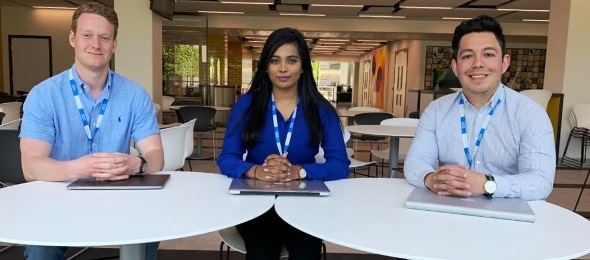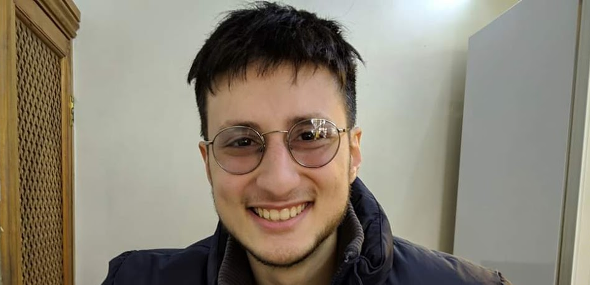Students from the Department of Engineering are among the winners of the Vice-Chancellor’s Social Impact Awards 2020. One prize went to a group of Masters students for their efforts in supporting Addenbrooke’s Hospital during the current COVID-19 pandemic, and the other prize was awarded to a student for his commitment to and involvement in sustainability projects.
This year we received extraordinary nominations and students showed great talent across all fields of endeavour, grappling with really difficult social issues. They showed creativity, commitment, of course, but also entrepreneurship.
Vice-Chancellor, Professor Stephen Toope
Supported directly by the Vice-Chancellor of the University, Professor Stephen Toope, the Awards, organised by Cambridge Hub, took place virtually this year to recognise and celebrate exceptional achievement in social impact amongst the University’s student population.
Among the winners of the Masters students’ category were David Cordova Jimenez, Jack Levy and Fathima Nisha Begum Samad, who are all MPhil students in Industrial Systems, Manufacture and Management (ISMM) at the Institute for Manufacturing (IfM), part of the Department of Engineering. Together they applied their knowledge of industrial practices to assist the experts at Addenbrooke’s Hospital and The Baker Lab at The Cambridge Institute of Therapeutic Immunology and Infectious Disease (CITIID), in streamlining testing for COVID-19.
“Dr Florian Urmetzer, our Course Director, worked closely with Addenbrooke’s Hospital to determine where our skills and knowledge would be of most value and where we would have the most impact,” said David.
“One of our tasks was to design and propose a layout of the new staff testing facility, where symptomatic or asymptomatic healthcare workers could be tested for COVID-19. What we created provided capacity for up to 300 tests per day.
“Another issue we tackled was the inconsistent flow of samples from swabbing stations to the labs, which was causing inefficient use of lab resources. After interviewing key personnel, carrying out observations, and applying industrial engineering tools, we created a production planning tool that used a series of algorithms to automatically create the most optimal test plan over a four-week period. We are pleased that our interventions have been successfully implemented and used at Addenbrooke’s Hospital to maximise testing capacity.”

From left, Jack Levy, Fathima Nisha Begum Samad and David Cordova Jimenez.
“This experience has given us a great insight into managing the workflow of a temporary testing facility using academic laboratories,” added David. “We have written a paper, supervised by Professor Stephen Baker, to design a testing framework so that other NHS trusts can replicate the successful procedures we have developed here to help speed up vital COVID-19 testing.”
The team’s nominator said: “The students have been involved in a wide number of tasks, such as optimising the swab drive-through testing facilities (front-end), planning layout changes’ data management systems and optimising the labs for testing. They have been working with the The Baker Lab and Cancer Research Institute to help maximise capacity for COVID-19 testing. A report identifying the key issues of drive-through testing and a set of recommendations was submitted, and Addenbrooke’s Hospital is implementing these straight away. This has also led to the manufacturing of key medical components for the machines used in the Quantitative PCR (qPCR) tests1. Achievements include identifying opportunities and implementing changes to double the capacity of staff testing.”

Puria Radmard.
Meanwhile, second year Engineering undergraduate Puria Radmard has been announced a winner of the Undergraduate students’ category for his involvement in multiple sustainability projects across the University, including his work on the Cambridge Carbon Map. This is a project involving the local council and various other community partners across Cambridgeshire, which aims to plot the carbon emissions of buildings across the city.
Puria said: “It feels great to have won this award and I'm glad that I've been able to actively contribute to providing solutions to issues that are closest to me. I'm in an environment where the focus and hard work to do this, is fostered and supported by my colleagues. Going forwards, I’m looking to develop a career in machine learning and applying the cutting-edge technology in the environmental domain.”
Puria’s nominator said: “Puria has been involved in a highly committed way with a number of initiatives and organisations across Cambridge. I first came across him volunteering as part of a group called The Sustainability App, whose main aim was to produce an app giving evidence-based advice on day-to-day sustainability choices to the student population. He has further been involved in the Cambridge Carbon Map and significantly, Puria has also been heavily involved in founding a group called ClimaTalk. It aims to facilitate national and international student conversations about climate change policy in the run up to 2020 United Nations Climate Change Conference, also known as COP26, with the support of Cambridge Zero.”
Professor Toope said: “This year we received extraordinary nominations and students showed great talent across all fields of endeavour, grappling with really difficult social issues. They showed creativity, commitment, of course, but also entrepreneurship. Our communities need ideas, they need energy of students, perhaps more than ever before. It really is a difficult time and I think the resilience of our communities is being tested. So it is just marvellous to see the ideas that these students have generated.”
--
1 A technology used for measuring DNA using polymerase chain reaction.

